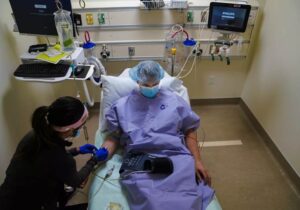As I’ve learned through my interviews with patients experiencing serious illness, treatments can be grueling, leaving patients emotionally and physically exhausted. During her treatment for breast cancer, Jackie, a single mom with a teenage son, recalls:
Many, many times, you get home and you just, you feel so alone, and I’ll have that emotional breakdown. I’m like, this is really hard. I had no one there to just hold me, But, you have to allow yourself to do that too, you really, really do. You have to allow yourself to let that out.
Jackie
The focus for patients in treatment is making it through each day, as it should be. Getting through to the other side of treatment is a goal, wrapped in hope and the expectation of reclaiming the life, the way of being in the world so cruelly interrupted by illness. The reality though is often different.
Jaime, a young mother with two children, was diagnosed with Stage 4 colon cancer after a year and a half of chasing doctors in search of an answer for her pain. Our interview happened just a few months after she was told the cancer was gone so her answer to my question about how the disease had affected other areas of her life surprised me.
[With] survivorship a lot of times, people will say okay, well, you’re cancer-free now, so, everything goes back to normal. Not so much. [She laughs] I would almost rather go through treatment and knowing what I’m dealing with then, you’re disease free and having that fear in the back of my head… There’s always that little seed of doubt that, what if it comes back.
Jaime
The challenge of recovery is a reoccurring theme in my interviews. It is also a theme that is beginning to be shared by other writers who are former patients. These writings sharply illustrate the surprise to find post-treatment often more painful, difficult, and frightening than treatment. Jamie Aten, founder and executive director of the Humanitarian Disaster Institute, utilized techniques he teaches PTSD patients to manage his own experiences post-treatment¹.
Beth Stebner, a Brooklyn-based writer and editor diagnosed with ovarian cancer six months before her wedding, describes what she felt after leaving treatment²:
I carried more sadness, anger, anxiety, and fear than I’d ever had before – or even during – my health scare. I was terrified that the second I became comfortable in my old routines my disease would return, taking away everything that I worked so hard to rebuild.
Beth Stebner
In all of these experiences, there is an element of surprise. Recovery remains somewhat shrouded in mystery. Patients don’t talk about it and the focus of healthcare dollars and research is on diagnosis and treatment rather than what happens after treatment ends.
In fact, recovery, similar to a serious illness, hits the trifecta of factors that contribute to a healthy balance for living – psychological, social, and physical. Here are some of the ways issues emerge during recovery:
- Physical – Pain, Nauseousness, Fatigue, Unsteadiness, Weight gain/loss, Side effects from treatment
- Psychological – Anxiety, Fear of a recurrence of illness, Depression, Lack of self-esteem/confidence, Shame
- Social – Isolation, Loneliness, Support systems after treatment wane or vanish, Reluctance to reach out and ask again for support
It is critically important to recognize recovery is just as much a part of the patient journey as diagnosis and treatment. Here is an opportunity to begin a dialogue for change. Key points to consider:
- Awareness – A recognition that just because treatment ends, doesn’t mean that all is better. In fact, recovery is a new beginning. Recovery is a time to allow the body to rest and heal.
- Communication – Let people know what is going on, rather than trying to pretend that all is well. Be honest with yourself and others.
- Advocacy/Support – Trying to go it alone only slows and impedes the body’s ability to recover. Support is needed as much in recovery as in times of serious illness.
- Compassion – Be kind to yourself. Patience and understanding are needed in abundance.
Please know that although illness and recovery can be very isolating experiences, you are not alone. Others have travelled this path, and there is an opportunity to learn from these experiences.
* Quotes in this post are from interviews conducted for my book, Navigating Illness: The Patient Experience, a work in progress. Names were changed upon an individual’s request.
¹ Aten, J., (April 29, 2019). Coping with Trauma. Cancer Today.
² Stebner, B. (May 9, 2019). After Beating Ovarian Cancer at 30, The Real Battle Began.



